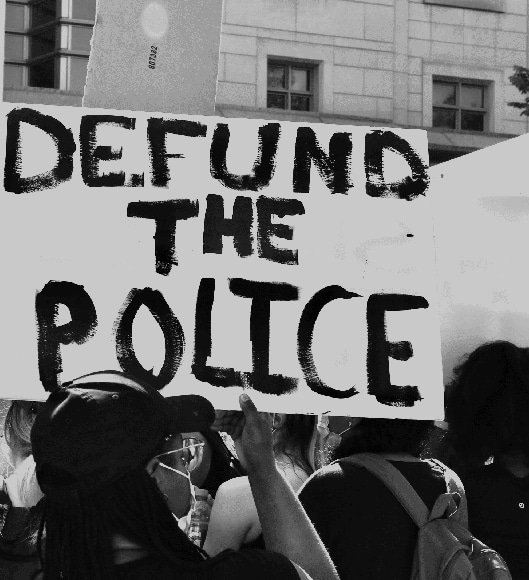What Does Defund the Police Mean?
Were you or a loved one a victim of police brutality?
Attorneys that work with Police Brutality Center may be able to assist you.
"*" indicates required fields
Content Last Updated: March 3, 2025
The brutal police killings of Michael Brown of Ferguson, Missouri, and Freddie Gray of Baltimore triggered a movement led by Black Lives Matter that brought systemic racism back to the forefront of American consciousness.
A public outcry with demands for reform quickly followed. The subsequent high-profile police murders of Breonna Taylor and George Floyd in 2020 shocked the world and birthed the defund the police movement.

What is defunding the police?
Defunding the police is a systematic reallocation of funds from police departments to better-qualified social services and public health agencies. This approach eliminates the need for punitive policing by addressing the root causes of violent crime.
A 2020 op-ed by the Washington Post defines defunding the police as a reimagining of public safety in America. It is a vision of a world where:
- Homelessness is not criminalized but addressed with compassion and support
- Mental health crises are managed by counselors rather than police
- All citizens have equal access to education, job opportunities and health care
Police are regularly provided with military-grade equipment and are trained to believe civilian encounters, especially with black people, are dangerous. This encourages police brutality without reducing crime or protecting the public.
Defunding the police offers a civilized means of establishing public safety.

How Police Funding Should Be Reallocated
Defunding the police prioritizes health care, housing and education over law and order approaches to maintaining order.
Investment in community resources and the simultaneous divestment of police departments are key to safer communities while limiting police power.


Mental Health Services
Police officers are unqualified to intervene in mental health emergencies, yet they are often called upon to do so. Even routine welfare checks often escalate and end in police shootings. Since 2015, individuals suffering from mental illness account for nearly 25 percent of police shootings.
Defunding the police would allow funds to be allocated to emergency response units operated by qualified mental health professionals with training in de-escalation techniques and resources for ongoing care.

Traffic Services
Traffic stops are the most common reason individuals experience contact with law enforcement. Although 75 percent of Americans are white, only 26 percent of traffic stops involve white drivers. Often as a result of racial profiling, Black Americans are more likely to be stopped and searched but less likely to receive tickets.
Traffic stops are often initiated because of minor violations. They can quickly escalate into deadly encounters characterized by police violence.
- Walter Scott was shot by police in Charleston, South Carolina, as he fled after being stopped for a burned-out brake light.
- Samuel Dubose was shot in the head by police in Cincinnati, Ohio, after being stopped for a missing front license plate.
- Philando Castile was shot seven times by a white Minneapolis police officer while reaching for his wallet.
Instead of police enforcement of traffic laws, funding could be reallocated to traffic control agencies that are not connected to the police.
The agencies could establish automated traffic control devices and issue in-person tickets. Agents would not have the authority to search vehicles or make arrests and would be unarmed.

Crime Investigation
Police are usually called after a crime has occurred, and they are not adept at solving crimes. Nationwide, the following crimes go unsolved:
- 38 percent of murders
- 66 percent of rapes
- 70 percent of robberies
- 47 percent of aggravated assaults
The numbers are even worse for non-violent crimes, which go unsolved 70 to 85 percent of the time.
Funds should be reallocated to skilled, educated professionals who can more effectively investigate crimes, such as sociologists, doctors and forensic scientists.
Rapid response teams comprised of trained specialists could be deployed in those rare instances when police would have been called to intervene while the violence is occurring.



Gender-Based Violence
As few as 20 percent of rapes are reported in the United States, and every day, four women are killed by their partners. Law enforcement is ineffective at preventing gender-based violence.
Native American and black women are the most frequent victims of domestic abuse, and many are afraid to call the police because they fear their partners will be killed or incarcerated.
Funds could be diverted to counseling programs, restorative justice programs and community-based emergency response organizations that offer victims of domestic violence an alternative to 911.
These programs offer counseling services that allow victims and perpetrators to discuss the impact of the abuse and formulate plans for safety and repair.


Enforcement of Bylaws
Bylaws criminalize poverty and homelessness. They include laws against the following:
- Loitering
- Sleeping in public
- Public urination
- Public intoxication
- Panhandling
- Loitering
- Sleeping in public
- Public urination
- Public intoxication
- Panhandling
Instead of paying police to harass and punish the homeless for existing in public spaces, funding could be redirected to providing more shelters and housing, free transportation services, and clean, free public toilets.
Decriminalization
Law enforcement would be less necessary if there were fewer arbitrary laws to enforce.

Fare evasion
Police presence in transit service stations is intimidating and often predicated on punishing those who cannot afford to pay transit fares. Instead of paying police to punish people for being poor, those funds would be better spent making transportation free for all and making city roadways safer for bicyclists and pedestrians.

Legalize recreational drugs
Despite an annual $51 billion price tag, the war on drugs has been ineffective at stopping drug abuse or preventing crimes, but it has provided law enforcement with another way to target people of color and the poor.
Prisons are overflowing with drug offenders who need help rather than punishment.
Legalizing recreational drugs would transition enforcement to the Department of Health and Humans Services (HHS). HHS could institute a safer supply program that allows addicts to receive free drugs and access safe areas in which to use them.
This would prevent many opiate overdose deaths and eliminate the cartelization of the drug trade, resulting in safe streets for everyone.
Drug addiction is a brain disorder that should be regarded as a public health issue rather than a crime. The massive savings from ending law enforcement’s role could be reinvested in drug and alcohol rehabilitation programs, resulting in many benefits:
- The cost to rehabilitate is lower than imprisonment.
- Rehabilitation increases the likelihood of stable employment and housing.
- Rehabilitation decreases crime.

Education Equality
Multiple studies have shown that education is the most important means of decreasing crime. Black students face a hostile learning environment in K-12 schools thanks to the presence of school resource officers.
Police officers facilitate distrust among students and between students and school personnel. This creates a domino effect that does the following:
- Adds to dropout rates
- Introduces youth to the criminal justice system before they reach adulthood
- Undermines higher education and future job opportunities
Funds for school resource officers could be reallocated to school nurses, social workers and mental health counselors.
Does defunding the police mean abolishing the police?
The defund movement is about demilitarizing police and reducing violent encounters between police and citizens.
While the conversation is national, every community is unique and must decide individually which responsibilities should be removed from their respective police departments.
Lawmakers in some communities may find that abolishing the police is a viable solution.

Will defunding the police lead to more crime?
There is no evidence that increased police surveillance decreases crime, and only five percent of arrests are for serious crimes. Defunding the police replaces reliance on the militaristic approach to law enforcement with initiatives that support non-punitive approaches.

Municipalities that Are Defunding the
Police
Several local governments have instituted reductions in police department budgets, such as in the examples below:
Minneapolis City Council members voted to abolish the police shortly after the death of George Floyd. They have yet to follow through, but they have reallocated $8 million to launch a mental health team to respond to certain 911 calls.
Austin, Texas has a vision of showing the rest of the country that defunding police works. The city has reinvested $80 million in police budget cuts into mental health first responders, hotels and services for the homeless, food access, workforce development and victim support.
The City of Los Angeles reduced its police department’s budget by $150 million and allocated the funds to minority programs. However, it has since increased its police budget.
New York City’s officials vowed to cut the $6 billion NYPD budget by $1 billion and shift monitoring of school safety, illegal street vending and homeless people away from the city’s police department.
Why not just reform the police?
Public support for the defund movement has waned. While President Biden has never supported defunding the police, he has been a proponent of police reform.
The United States already spends $100 billion annually on policing and an additional $80 billion on incarceration, yet America has not become safer.
Longstanding police violence toward people of color has bred irreparable mistrust between the police force and black communities. Defunding the police may be the only way to restore trust.
The rallying cry of the defund movement is one of hope and optimism. It is a message of trust in one another, that together we can create a safer, friendlier world for everyone.

